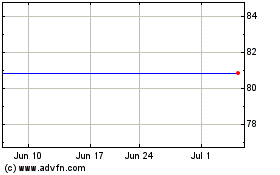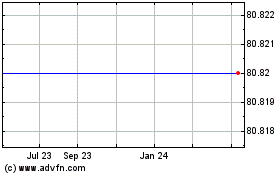Market For Heart Devices Won't Get A Jolt Anytime Soon
February 15 2012 - 9:01AM
Dow Jones News
Don't expect sales of devices that shock the heart to get a jolt
anytime soon.
The domestic market for implantable cardioverter defibrillators,
or ICDs, slumped an estimated 14% to 15% in the final three months
of 2011, according to Bernstein Research, and is projected to be
down 11% in 2011 to $3.73 billion. New products aren't expected to
halt the declines as Bernstein projects another 3% drop in
2012.
"We may continue to see market stress during 2012," St. Jude
Medical Inc. (STJ) Chief Executive Daniel Starks said last month
about the broader cardiac rhythm market, which includes ICDs. "We
may very well have a mixed year with the first half of the year
continuing to be a little bit weaker."
St. Jude and Boston Scientific Corp. (BSX) are key players in
the U.S. market, with Medtronic Inc. (MDT) as the leader. The three
companies declined to comment on their ICD sales and strategy for
this story.
Sales of ICDs have suffered after a study published in a
prominent medical journal indicated that the devices, which provide
a shock to the heart when needed in patients with irregular
heartbeats, were being used outside of clinical guidelines.
Additionally, the Department of Justice has had an ongoing probe
into reimbursement submissions for ICDs.
Companies and industry followers say those two factors have
pressured ICD volumes as doctors adhere more closely to guidelines
and as implant practices get more scrutiny.
Also not helping is that the market for ICDs--like stents, hip
and knee implants, and other medical devices--is facing downward
pressure on pricing because the industry's hospital customers are
trying more aggressively to trim costs.
In the case of ICDs, "generally, the days of double-digit growth
seem to be well in the past," said Raj Denhoy, an analyst at
Jefferies & Co. "Pricing is going to remain pretty bad for
these guys."
Woes in the heart market have weighed on the companies' stocks.
Shares of Boston Scientific are down 15% in the past 12 months,
while St. Jude is off 7.9%. Medtronic shares are down a fraction
for the period; the company, which is larger and more diversified
than its competitors in the space, is scheduled to report its
fiscal third-quarter earnings next week.
In the face of slumping sales, companies are focusing on
developing products that offer faster-growing sales potential, such
as catheter-delivered heart valves and treatments for high blood
pressure. But it's a strategy that will take time to produce
results.
"There's a hole in the bucket, and you can't fill it fast
enough," Denhoy said.
Last year, Boston Scientific announced U.S. Food and Drug
Administration approval of new cardiac resynchronization therapy
devices--a subset of ICDs. The company says the new products offer
longer battery life and are smaller and thinner than competing
devices, which is considered a cosmetic benefit.
"These new devices maintain our advantage in size and shape,
which is often a critical factor for our patients," said Hank
Kucheman, the company's interim chief executive, on Boston
Scientific's fourth-quarter earnings call.
St. Jude has said it expects to gain at least one percentage
point of share in the global cardiac rhythm market on a new ICD
system that received U.S. approval late last year. The company says
the new product limits complications and allows doctors more
flexibility when implanting the device. St. Jude, however, is
dealing with concerns over problems with wiring in separate
ICDs--so any gains from the new product could be offset by share
loss resulting from that issue.
Part of the difficulty for device makers is convincing hospitals
to pay higher prices for new products.
"The features in the devices are similar enough that you can
legitimately use any of the major companies' [products] and rescue
the patients," said Bruce Wilkoff, president of the Heart Rhythm
Society, a group for doctors, nurses and scientists treating rhythm
disorders.
-By Anjali Athavaley, Dow Jones Newswires; 212-416-4912;
anjali.athavaley@dowjones.com
SJM (NYSE:STJ)
Historical Stock Chart
From May 2024 to Jun 2024

SJM (NYSE:STJ)
Historical Stock Chart
From Jun 2023 to Jun 2024
